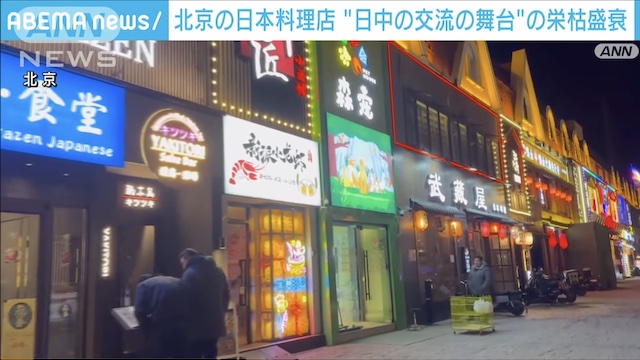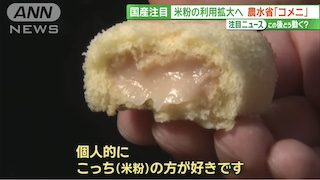BEIJING, Feb 25 (News On Japan) - A long-standing Japanese restaurants in Beijing has been forced to close, suffering the impact of a three-year-long zero-COVID policy and the backlash from Japan's policy to release treated water from Fukushima's stricken nuclear plant.

It was a restaurant beloved by regular customers.
Manager Kenta Takenaka of "Nadaman" Beijing: "We have been able to offer experiences that cannot be had in Japan."
Head Chef Yu Igarashi: "We look forward to meeting you somewhere again."
Customer: "It's sad that there will be no place in Beijing to truly enjoy Japanese cuisine."
On the other hand, some Japanese restaurants have returned to Beijing...
"Yuritei," a Japanese restaurant located in Beijing, has reopened after some time.
Yuko Asako, known as the "mother of Beijing," has been running an izakaya in China for 28 years. After temporarily returning home due to the COVID-19 pandemic and for medical treatment, she returned to Beijing in October last year, after about four years.
Regular Customer: "We've been eagerly awaiting her return. She looks so lively. Very lively indeed."
Yuko Asako: "During my absence, the Chinese customers really helped me. I want to repay their kindness somehow."
Undeterred by adversity, she held an Okinawan event on this day. Customers from Japan and China enjoyed the event together.
Customer: "I can't wait to visit Okinawa!"
Beijing has seen numerous dramas in its various Japanese restaurants. But which of these restaurants was the first?
Yuko Asako: "I think it was 'Baiyun.'"
Japanese Chef Kei Miwa: "That's what I've heard too."
The Japanese restaurant "Baiyun" was opened in July 1983 with the goal of private exchanges between Japan and China under the cooperation of both countries. Along with a Japanese restaurant in the luxury hotel "Beijing Hotel," it is considered the first generation of Japanese cuisine.
Former Chef of "Baiyun," Juan Yong Liu (64): "I was 22 or 23 years old."
Liu was dispatched to Tokyo for six months to open "Baiyun" and learn Japanese cuisine from scratch.
Juan Yong Liu: "I couldn't even hold a knife at first. I cut my hands a lot."
Aiming for authentic Japanese cuisine, beef and tuna were airlifted from Japan. Essential vegetables such as trefoil and perilla were grown from seeds brought from Japan in Beijing fields.
Juan Yong Liu: "Because it seemed like it was run by Chinese, some Japanese people didn't believe it was good. However, after seeing our ingredients and eating the food, they loved it."
Now retired...
Juan Yong Liu: "Because of this job, I have an attachment to Japan. After retiring, I have been visiting Japan every year."
Digging deeper, even more history was revealed.
In the early 1960s, ten years before the normalization of diplomatic relations between Japan and China, there was the first post-war Japanese restaurant "Wafu" in Wangfujing, Beijing's downtown area. It is introduced as "a rare Japanese-style entrance" at the time, saying "you can enjoy delicious Japanese cuisine in Beijing."
Shiro Minami, who was called a pro-Japanese figure and played a role in the opening of "Wafu," along with Liao Chengzhi and Koichi Saionji, who were called civilian ambassadors.
Minami, Representative of the Japan-China Future Association (94): "I was worried about opening a Japanese restaurant. I was worried that even if it opened, Chinese people would come and complain."
Despite the anxiety, it was a successful start...
Minami: "As soon as we opened, it was packed every day. The rooms were mostly full every day, which was unusual."
It is said that tatami mats imported from Kyoto were used in the banquet hall, and people from both countries, who were called "the people who dug the well of Japan-China relations," enjoyed sashimi and sushi while discussing the future of both countries.
Minami: "I think that restaurants have contributed to Japan-China exchanges. I think it's the foundation. If civilians from Japan and China cooperate, the government will have no choice but to move."
After 60 years, Japanese restaurants in Beijing have steadily expanded their foothold. Today, Ms. Asako continues to stand by her restaurant.
Yuko Asako: "To be honest, the dining situation in Beijing is very bad. My dream and hope for next year (2024) is that everyone who passes through the gates of 'Yuritei' will return home feeling better."
Source: ANN










